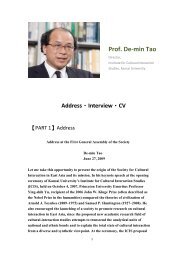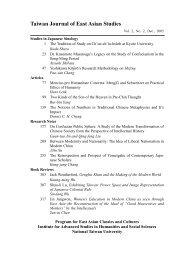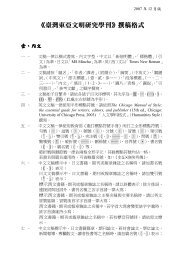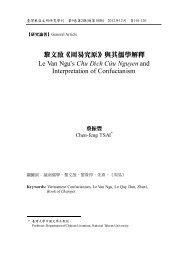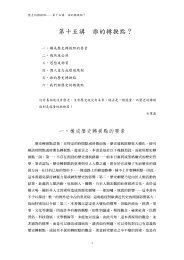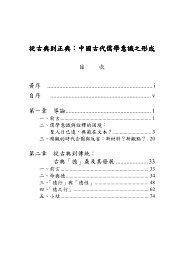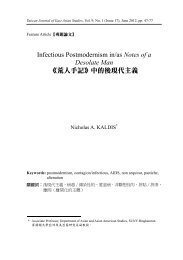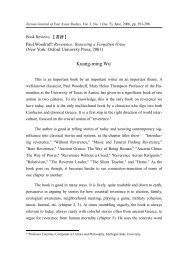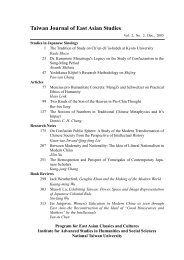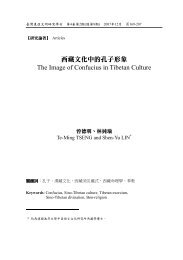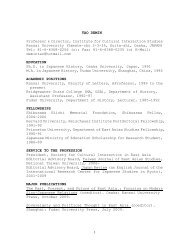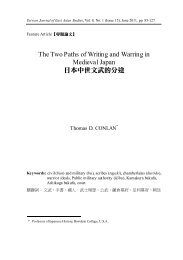臺灣東亞文明研究學刊 - 東亞經典與文化研究計畫 - 國立臺灣大學
臺灣東亞文明研究學刊 - 東亞經典與文化研究計畫 - 國立臺灣大學
臺灣東亞文明研究學刊 - 東亞經典與文化研究計畫 - 國立臺灣大學
You also want an ePaper? Increase the reach of your titles
YUMPU automatically turns print PDFs into web optimized ePapers that Google loves.
162 Taiwan Journal of East Asian Studies, Vol. 4, No. 2 (Iss. 8), Dec., 2007<br />
influenced every aspect of one's life, including one's favorite spectacles: "A<br />
fondness for those surprising feasts of bodily agility and dexterity which form the<br />
arts of the tumbler and the juggler, is a feature in the character of the Hindu. It is a<br />
passive enjoyment which corresponds with the passiveness of his temper." 27 This<br />
prompted Mill to offer a comparison.<br />
In point of address and temper, the Mahomedan is less soft, less smooth and<br />
winning than the Hindu. Of course, he is not so well liked by his lord and<br />
master the Englishman; who desires to have nothing more to do with him,<br />
than to receive his obedience. In truth, the Hindu, like the Eunuch, excels in<br />
the qualities of a slave. The indolence, the security, the pride of the despot,<br />
political or domestic, find less to hurt them in the obedience of the Hindu,<br />
than in that of almost any other portion of the species. But if less soft, the<br />
Mahomedan is more manly, more vigorous. He more nearly resembles our<br />
own half-civilized ancestors; who though more rough, were not more gross;<br />
though less supple in behaviour, were still more susceptible of increased<br />
civilization, than a people in the state of the Hindus. 28<br />
To Mill, as to Ferguson, civic virtue and vigor were the antidote against despotism,<br />
which made the Hindus obedient and even slaves. 29 Like Ferguson, Mill turned to<br />
the idea of despotism as a counterpoint to the civic virtues he saw embodied in<br />
Indian Muslims and his fellow countrymen. Ferguson had relied on Montesquieu's<br />
critique of despotism to prescribe republican ideals.<br />
But if a rigorous policy, applied to enslave, not to restrain from crimes, has<br />
an actual tendency to corrupt the manners, and to extinguish the spirit of<br />
27 James Mill, History of British India (London, 1840), vol. 1, pp. 335.<br />
28 Mill, History of British India, vol. 2, pp. 365-366.<br />
29 "…… the Hindus, in mind and body, the most enslaved portion of the human race." Mill, History<br />
of British India, vol. 2, p. 132.<br />
xiv



